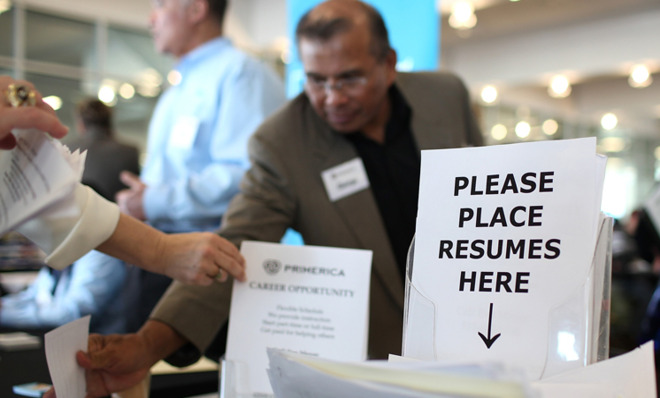Is a lack of skilled workers hurting the labor market?
The U.S. could certainly improve in this area. But the main problem with the economy is a shortage of jobs.

A free daily email with the biggest news stories of the day – and the best features from TheWeek.com
You are now subscribed
Your newsletter sign-up was successful
Six years after the financial crisis, the jobless rate remains high. Unemployment is running at 6.2 percent, meaning nearly 10 million Americans are looking for a job. The U.S. economy has made decent progress since 2008, but it hasn't been enough.
Is a lack of skilled workers to blame? In other words, are American workers not qualified enough to fill open positions, keeping the unemployment rate elevated?
Employers claim to be struggling to find employees with the right skills. According to a recent poll, the NFIB small-business optimism survey, 81 percent of employers looking for new employees claim they can't find the right people:
The Week
Escape your echo chamber. Get the facts behind the news, plus analysis from multiple perspectives.

Sign up for The Week's Free Newsletters
From our morning news briefing to a weekly Good News Newsletter, get the best of The Week delivered directly to your inbox.
From our morning news briefing to a weekly Good News Newsletter, get the best of The Week delivered directly to your inbox.
Fifty-three percent of the owners hired or tried to hire in the last three months and 42 percent (81 percent of those trying to hire or hiring) reported few or no qualified applicants for open positions. (NFIB.com)
What kind of skills are they looking for? A 2013 survey of employers by the Association of American Colleges and Universities found that more than three fourths of employers believed college graduates were lacking in critical thinking, complex problem solving, written and oral communication, and applied knowledge in real-world settings. Nearly all employers surveyed (95 percent) said they give hiring preference to candidates with skills that will enable them to contribute to innovation in the workplace.
In the long run, developing a more skilled workforce should be a key challenge for universities and policymakers.
But the fact is that this mismatch between workers and employers has been around for a while. That means it can't be considered a truly significant drag on the labor market.
A 2012 study by economists David Neumark and Robert Valetta at the Federal Reserve Bank of San Francisco shows that the problem of finding skilled workers was as much a problem before the recession as it is now.
A free daily email with the biggest news stories of the day – and the best features from TheWeek.com
Neumark and Valetta point to a variety of evidence, including a 2011 IMF paper that finds the skills mismatch in 2010 was only "1 3⁄4 percentage points higher than before the onset of the housing market meltdown" at the end of 2006.
Indeed, this isn't even just a U.S. phenomenon. Figures from the Organization for Economic Cooperation and Development on overqualification and underqualification show that the U.S. is relatively typical among developed countries.
The bigger and more immediate issue in the labor market remains a shortage of jobs. The most recent data shows there are still two job seekers for every job opening. That's a great improvement on the 5:1 ratio in the direct aftermath of the recession, but it still isn't good enough to start claiming that a bevy of unskilled workers is causing the elevated unemployment rate.
The U.S. only just made up for all the jobs lost in the Great Recession in May of this year. And that doesn't even account for population growth. The real issue holding up the unemployment rate remains insufficient job creation.
John Aziz is the economics and business correspondent at TheWeek.com. He is also an associate editor at Pieria.co.uk. Previously his work has appeared on Business Insider, Zero Hedge, and Noahpinion.
-
 The ‘ravenous’ demand for Cornish minerals
The ‘ravenous’ demand for Cornish mineralsUnder the Radar Growing need for critical minerals to power tech has intensified ‘appetite’ for lithium, which could be a ‘huge boon’ for local economy
-
 Why are election experts taking Trump’s midterm threats seriously?
Why are election experts taking Trump’s midterm threats seriously?IN THE SPOTLIGHT As the president muses about polling place deployments and a centralized electoral system aimed at one-party control, lawmakers are taking this administration at its word
-
 ‘Restaurateurs have become millionaires’
‘Restaurateurs have become millionaires’Instant Opinion Opinion, comment and editorials of the day